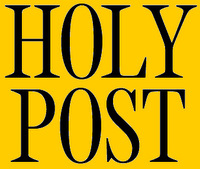National Post visits S+L: "Secure in their faith, in love with the Church, but frustrated as hell"
Kris Dmytrenko
Wednesday, April 14, 2010
 On Tuesday, S+L's production team was visited by Charlie Lewis, lead religion reporter for the National Post. Lewis asked each of us, as young Catholics in the media, how we feel about the Church's response to the clergy sexual abuse crisis, as well as how we've perceived the sometimes questionable mainstream media coverage. Today on the NP's Holy Post blog, Lewis shares his impressions from that discussion, as well as his own perspective on the discordant Church responses to the scandal.
On Tuesday, S+L's production team was visited by Charlie Lewis, lead religion reporter for the National Post. Lewis asked each of us, as young Catholics in the media, how we feel about the Church's response to the clergy sexual abuse crisis, as well as how we've perceived the sometimes questionable mainstream media coverage. Today on the NP's Holy Post blog, Lewis shares his impressions from that discussion, as well as his own perspective on the discordant Church responses to the scandal.
Stop blaming, start repenting By Charles Lewis, National Post April 14, 2010, 3:35 PM Earlier this week I met with a group of about a dozen young professionals at Salt and Light Catholic Television Network in Toronto. I was curious to find out their thoughts on the crisis now engulfing their Church, and mine. The first thing that became clear was that no one's faith in the Church had been diminished. All agreed the Church is run by men, that men are capable of sin and that the Church was much larger than the sum of its parts. Some agreed the Pope should do a major mea culpa for the sin of abuse that has occurred in the Church — not because they felt he was in any way responsible, but because as head of the Church he should answer for all of us and be capable of showing humility. The Gospels are big on humility. There was also some agreement that the Church has not done the best job in making its own case. I would say that was an understatement. Continue reading
Related Articles:
Category: General Posts
Tag: Catholic Church, Clergy Sex Abuse, crisis, National Post, Pope Benedict XVI
Pray with the Pope Reflection – June 2025
Friday, June 13, 2025
 Fr. Edmund Lo, SJ
Fr. Edmund Lo, SJ
In this month of June, the Holy Father invites us to pray that the world might grow in compassion, that each one of us might find consolation in a personal relationship with Jesus, and from his Heart, learn to have compassion on the world.
Chaplaincy: “Divine Coffee” for Students
Tuesday, June 10, 2025
 Gianpaolo Capozzi
Gianpaolo Capozzi
Gianpaolo gives us a behind the scenes look at his upcoming Behold segment on the York University Catholic Chaplaincy.
Pope Leo XIV’s homily for Pentecost Sunday 2025
Sunday, June 8, 2025
 Pope Leo XIV
Pope Leo XIV
On Sunday, June 8, 2025, Pope Leo XIV celebrated Mass for the Jubilee of Movements, Associations, and New Communities and spoke about how the Holy Spirit helps the apostles overcome "their fear, shatters their inner chains, heals their wounds, anoints them with strength and grants them the courage to go out to all and to proclaim God’s mighty works."
Homily of Pope Leo XIV at the Mass for the Jubilee of Families, Children, Grandparents, and the Elderly
Sunday, June 1, 2025
 Pope Leo XIV
Pope Leo XIV
Pope Leo XIV celebrated Mass for the Jubilee of Families, Children, Grandparents, and the Elderly and referred to Pope Francis and mentioned spouses who have been beatified and canonized, like the parents of St. Therese of the Child Jesus.
Looking back on Rerum Novarum
Monday, May 26, 2025
 Matthew Neugebauer
Matthew Neugebauer
Pope Leo XIV chose his name primarily to highlight his most recent namesake Leo XIII, whose "historic encyclical Rerum Novarum addressed the social question" to the challenges of his time. What concerns does the encyclical address? How does it speak to its time? And what has been its legacy 134 years later?
SUPPORT LABEL
$50
$100
$150
$250
OTHER AMOUNT
DONATE













